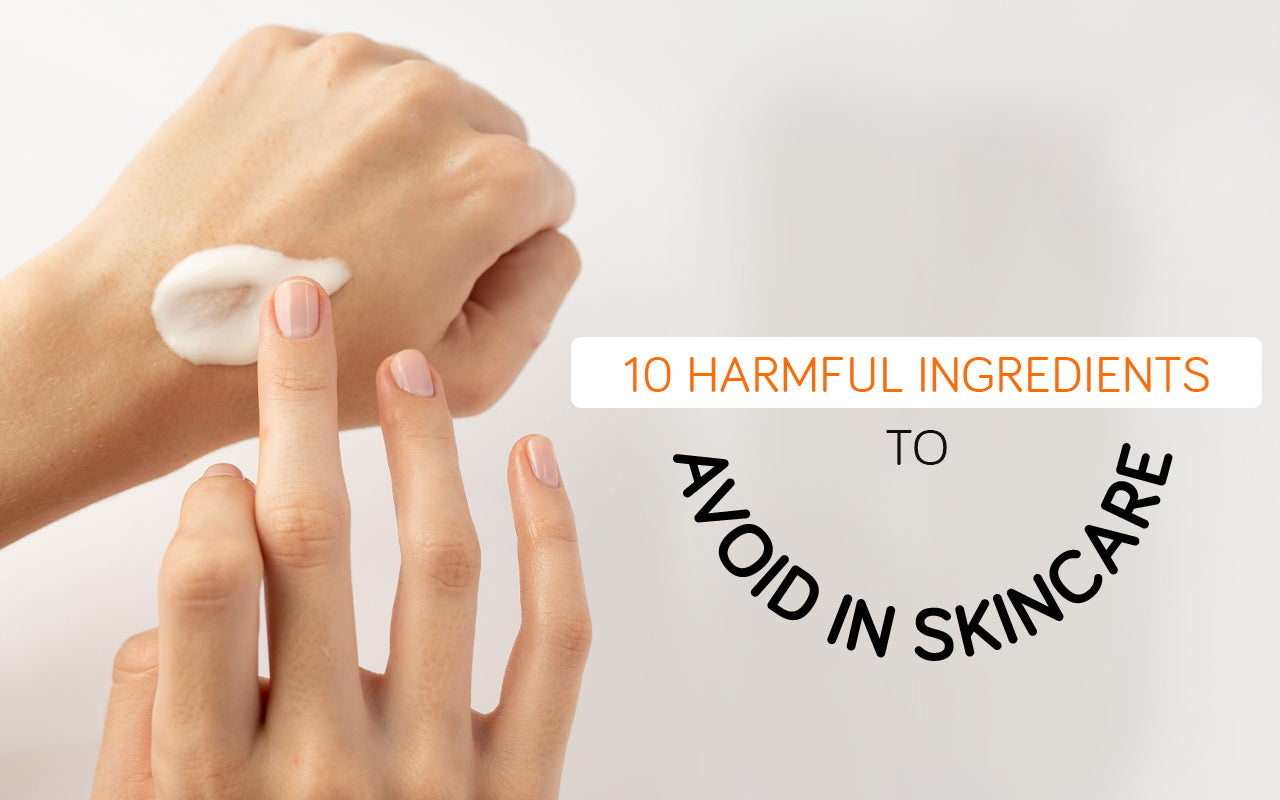

· By Suramya Jain
10 Harmful Ingredients to Avoid in Skincare
When was the last time you checked the labels of your skincare products?
Most of us do not even bother to check the ingredients. And yes, not all the listed ingredients in your favorite skincare products are safe. Did you know that cosmetics and skincare products are one of the least regulated products?
We’ve rounded up the top ten most problematic ingredients to avoid in skin care products:
- Parabens
Parabens are one of the most well-known ingredients to avoid. They are used to preserve lotions, make-up, and soaps that contain water, to prevent them from growing bacteria. Studies show that parabens damage one’s health, as they can imitate several actions of hormones in the body, disrupting normal hormonal functions. They can be the cause, in extreme cases, of reproductive issues, sterility and cancer also.
Hence, beauty products containing ingredients with the word “paraben” in them, should be avoided.
- Artificial Fragrance
Almost every single conventional skincare and cosmetic product (even “unscented” ones) contains artificial fragrances. Manufacturers aren’t required to reveal what’s actually in their fragrances, so you’ll simply see “Fragrance” or “Parfum” on the ingredients list when it could actually be a cocktail of allergens, endocrine disruptors, and irritants.
- Sodium Lauryl Sulfate and Sodium Laureth Sulfate (SLS/SLES)
SLS and SLES are powerful, inexpensive detergents and foaming agents used in shower gels and shampoos. They can be damaging for your health, causing sebum overproduction in hair and producing inflammatory reactions on skin. Those detergents are also capable of penetrating the skin and harming our organs in the long term, as it is very difficult to get rid of them once they are under your skin.
Look for sulfate names on labels, including another common and similar ingredient, Ammonium Lauryl Sulfate (ALS).
- Triclosan
The cosmetic industry uses triclosan as a preservative to stop bacteria from growing on the product and spoiling it. It's a biocide (a product that controls harmful or unwanted organisms through chemical or biological means) in many other personal care products such as deodorants, soaps, and shower gels.
It causes weakening of the immune system, uncontrolled cell growth, developmental and reproductive toxicity. You can find them in antibacterial soaps, deodorants, face washes, shower gels.
Triclosan is listed as hydroxy diphenyl ether.
- Phthalates
These toxic ingredients in skincare products are used to enhance fragrances and maintain scent for a long period of time. They are found in hairsprays, nail polishes, perfumes, lotions, shampoos and many other personal care products. Phthalates are also known as endocrine disruptors, causing hormonal & reproductive problems..
Appears in ingredient lists as DBP, DEHP, or DEP.
- Polyethylene Glycol (PEG)
A petroleum derivative, PEG is very popular in skincare products for its emulsifying and thickening properties. It also increases the permeability of your skin, leading to a greater absorption of the product in your body.
Dirty oil refining processes can contaminate PEGs with cancer-causing compounds that can also harm the human nervous system and impede development.
These compounds often appear as PEG followed by a number, sometimes combined with another ingredient (example: PEG-20 cocamine). Look for the PEG acronym to help decipher these complex ingredients to avoid in skincare routines.
- Formaldehyde
Formaldehyde is a colorless strong-smelling gas used as a preservative in skincare products. They help prevent microbial growth in water-based products. Studies link formaldehyde with elevated leukemia risk, and tumor growth.
Look for alternative names like quaternium 15, DMDM, urea-based ingredients, and glyoxal. As a helpful aid, some products are also explicitly labeled as formaldehyde free or “toxic-trio-free”.
- Ethylenediaminetetraacetic Acid (EDTA)
EDTAs are common preservatives that prevent the growth of bacteria, mold, and yeast. They also help beauty products foam, lather, and neutralize hard water build-up on your scalp and skin.
The main reason these ingredients should be avoided in skincare is that they are designed to help other harmful chemicals penetrate your skin barrier. They can also have potential impacts on cell health, reproductive systems, and skin irritation.
The two primary varieties of EDTAs in skincare products are disodium and tetrasodium EDTA. Most variations of this compound will include “EDTA” in the name.
- Aminophenol, Diaminobenzene, Phenylenediamine (Coal Tar)
Coal Tar is used in medicinal creams to treat itching, scaling, and flaking from conditions like psoriasis or dermatitis. This ingredient is also found in shampoos focused on scalp treatment, as well as in soaps and lotions.
Studies have shown coal tar compounds are toxic for the body and is also linked to skin cancer. These compounds can cause neurological damage like emotional fluctuations, change in sleep patterns, and loss of coordination.
To spot this toxic ingredient in skincare products, focus on coal-based keywords like coal tar, coal solution, and crude coal tar. Also be on the lookout for other names like estar impervotar, KC 261, picis carbonis, petroleum benzin, or naphtha.
- Butylated hydroxyanisole (BHA) and butylated hydroxytoluene (BHT)
This class of chemicals are synthetic antioxidants used in food and cosmetic preservation, and they are commonly found in lipsticks and other cosmetics.
These toxic ingredients in skincare products are potential carcinogens, and they can cause hormonal disruptions, liver & kidney damage, as well as thyroid problems. Lesser issues include fatigue, headaches, hives, and rashes.
To avoid these toxins look out for names like BOAs, dibutyl hydroxytoluene, DPBC, Avox, or Additin.
Knowledge is power—and you can feel good about taking steps to better understand exactly what you’re putting on your body. Think of this list as a jumping-off point for anyone curious about learning more about sketchy ingredients and clean beauty as a whole. We recommend doing your own research on all of the ingredients above, then making a decision that feels right for you.
